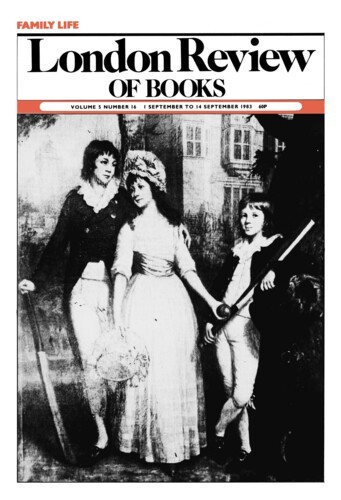Father Figures
Marguerite Alexander, 1 September 1983
Ladakh, a mountain region under Kashmiri control which lies between India, Tibet and Pakistan, becomes the object of Andrew Harvey’s quest after he is told by a young Frenchman in Delhi that ‘the mountains of Ladakh have been the setting for Buddhist meditation since three centuries before Christ was born.’ Less spoiled than more accessible Buddhist centres like Benares, it is becoming a magnet for religious adventurers, and the encounter between the young Englishman and the young Frenchman early in the book establishes a pattern. With one exception, a retired Indian businessman who has had to slough off the effects of an English education, Harvey’s fellow pilgrims are all Westerners who share and compare spiritual experiences in the way that dull sublunary travellers with more modest expections swap hotel and restaurant stories. A holy man tells Harvey towards the end of the book: ‘the east is not a large convalescent home for the west.’ The asperity is not directed towards the author, but we are nonetheless reminded of his description of himself in the years before he embarks on his journey. He writes of the ‘turbulence’ and ‘bitterness and solitude of my life’, and of ‘the limitations of my poetry, its obsession with irony and suffering, its largely unremitting anger and hopelessness’. Fortunately for the reader of this highly enjoyable book, Harvey’s sense of irony does not seem to have deserted him: there may perhaps be a use for it at All Souls College, Oxford, where this poet is now a fellow. He acknowledges that, while privileged young Westerners like himself are embracing Eastern values, there is a corresponding shift in the other direction, as young Easterners aspire to the fruits of Western materialism, and he has a sharp eye for the resulting confusions. In a fine comic episode, the author returns from a visit to a monastery to drown his spiritual bewilderment in drink (something called chang which, in keeping with the spirit of the place, inebriates without aftermath), then entertains the Ladakhi youth with a Bob Dylan song and a demonstration of disco dancing. He is good on the puritanical outrage of Westerners at any sign of commercialisation and turns in some Chaucerian vignettes of his fellow pilgrims. I liked the German woman who carries in her luggage eight bottles of gin (one of which she sells to Harvey) and three translations of the Dhammapada, and whose enthusiasm for the landscape is confined to the famous faces – the young Beethoven, Cardinal Wolsey – she sees in the rocks.–

